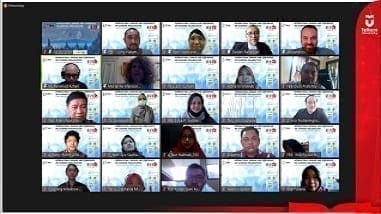 Bandung, Telkom University – Telkom University as No. 1 Private University in Indonesia continues to actively improve quality in achieving Research and Entrepreneurial University.
Bandung, Telkom University – Telkom University as No. 1 Private University in Indonesia continues to actively improve quality in achieving Research and Entrepreneurial University.
Telkom University through the School of Economics and Business held The 8th International Seminar and Conference on Learning Organization (ISCLO). This event was held on Wednesday (11/11) online via the ZOOM Meeting and broadcast live on the YouTube channel of SEB Telkom University.
Entitled Learning Organization in the New Normal Era, this activity will publish scientific articles on Marketing Management; Human Resources Management; IT & Operations Management; Economics, Financial Management, and Accounting; Entrepreneurship; and Strategic Management.
Dr. Ratri Wahyuningtyas as Dean of the School of Business Economics explained that The 8th ISCLO is a collaboration between Telkom University, Parahyangan Catholic University, and STIE Equitas. Articles that have been accepted and selected will be published in ISCLO Proceedings with ISSN 2354 6611. Some selected articles will be submitted to the Indonesian Management Journal accredited SINTA 2, Journal of Accounting and Finance accredited SINTA 5, International Journal of Technology Transfer and Commercialization and several Scopus Index Journal from the Indonesian Journal of Economics and Business, International Journal of Entrepreneurship and Small Business, Journal of Enterprising Community, International Journal of Business and Globalization, and International Journal of Public Sector Governance Management.
“We have many opportunities to publish articles. And The 8th ISCLO will also present international speakers. And I thank the parties who have contributed to organizing this event, I hope this event will run smoothly until the end and will provide many benefits for us. ” He said.
Jurry Hatammimi, S.E., M.M., Ph.D. as the Chief Executive at this event explained that this was the first ISCLO to be held online. The theme raised was following the current pandemic situation in organizational management during the New Normal era.
“Through written articles, we can conduct research, capture, and explore organizational processes that have been affected by the pandemic and are currently facing the New Normal. A portion of the funds raised from this event will be donated to people affected by the Covid-19 pandemic, “he said.
Dr. Dadan Rahadian as Deputy Chancellor for Academic Affairs also said that the last few months have greatly affected the economy, business, and even life. During this pandemic, we are faced with a lot of uncertainty and it affects reducing the amount of consumption by the people.
“Many small and medium enterprises have to put extra effort into maintaining their business. Health protocols are also widely applied including products, services, and services to the products and services themselves. Some of them are running smoothly, but not a few are not running smoothly. And this event is one of the right moments for us to learn to manage it all, adapt to the environment during this pandemic, “he said.
Dr. Dadan also added that the theme raised at the International Seminar and Conference Learning Organization was very relevant to the current New Normal situation. The challenges faced by organizations have a lot to do with technological disruptions and demographic changes and the most important objective of this event is to learn new things from one another through the exchange of ideas.
At this event also attended Prof. Alexandros Psychogios of Birmingham City University as Keynote Speech. Prof. Alexandros explained that a learning organization is an organization that develops a sustainable capacity to adapt and change. For organizations to learn and understand, evaluate, and make discoveries, they must be embedded in organizational memory.
“In organizational learning, there are two terms, firstly Single Loop Learning, which is errors corrected using routine policies and now, and the second is Double Loop Learning, namely errors are corrected by modifying the organization’s routine goals, policies, and standards. We have to keep updating the standard routines we use to solve problems or do work, “he said.
Prof. Alexandros also said that we need to think about all organizational processes, activities, functions, and interactions with the environment as part of the linkage system. We must communicate openly, across vertical or horizontal boundaries without fear of criticism or punishment. We must sublimate the personal interests and interests of the fragmented departments to work together to achieve a common vision of the organization. Organizational Learning must be a related process.
